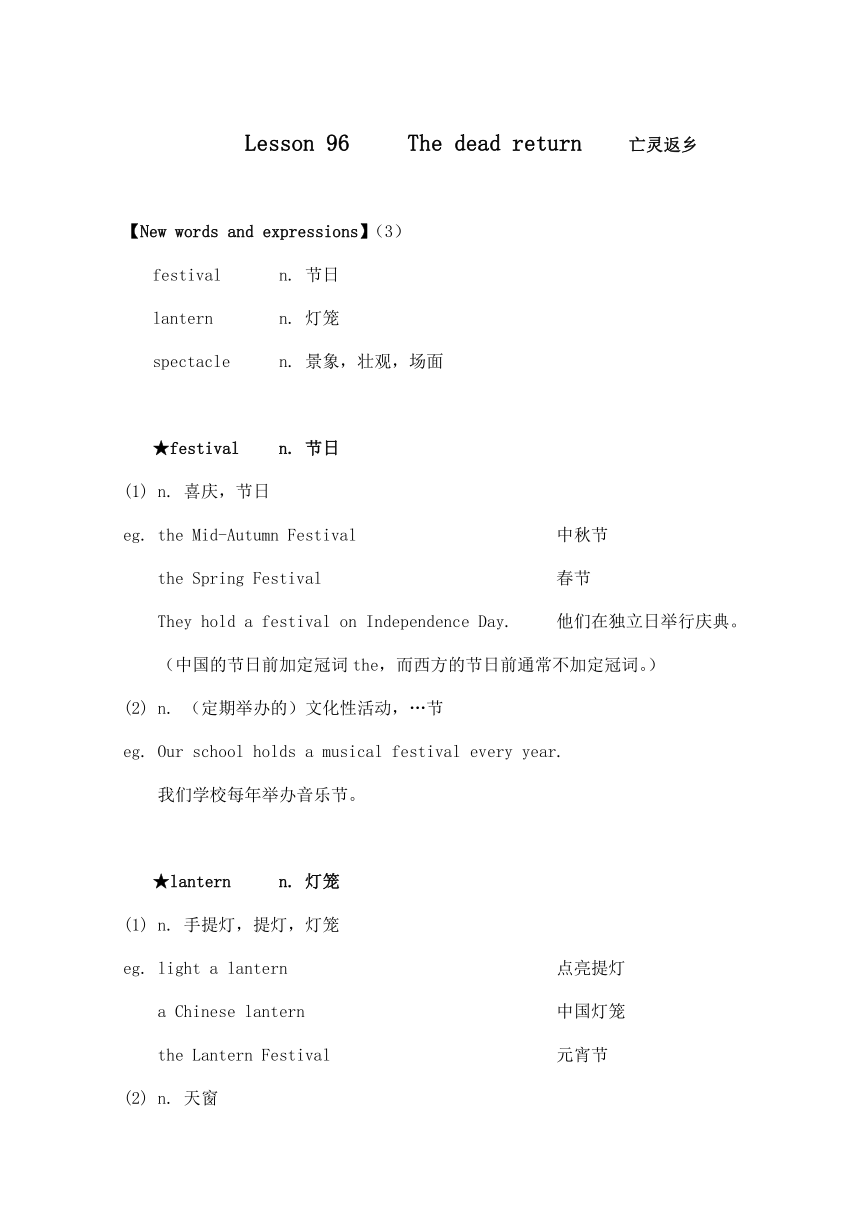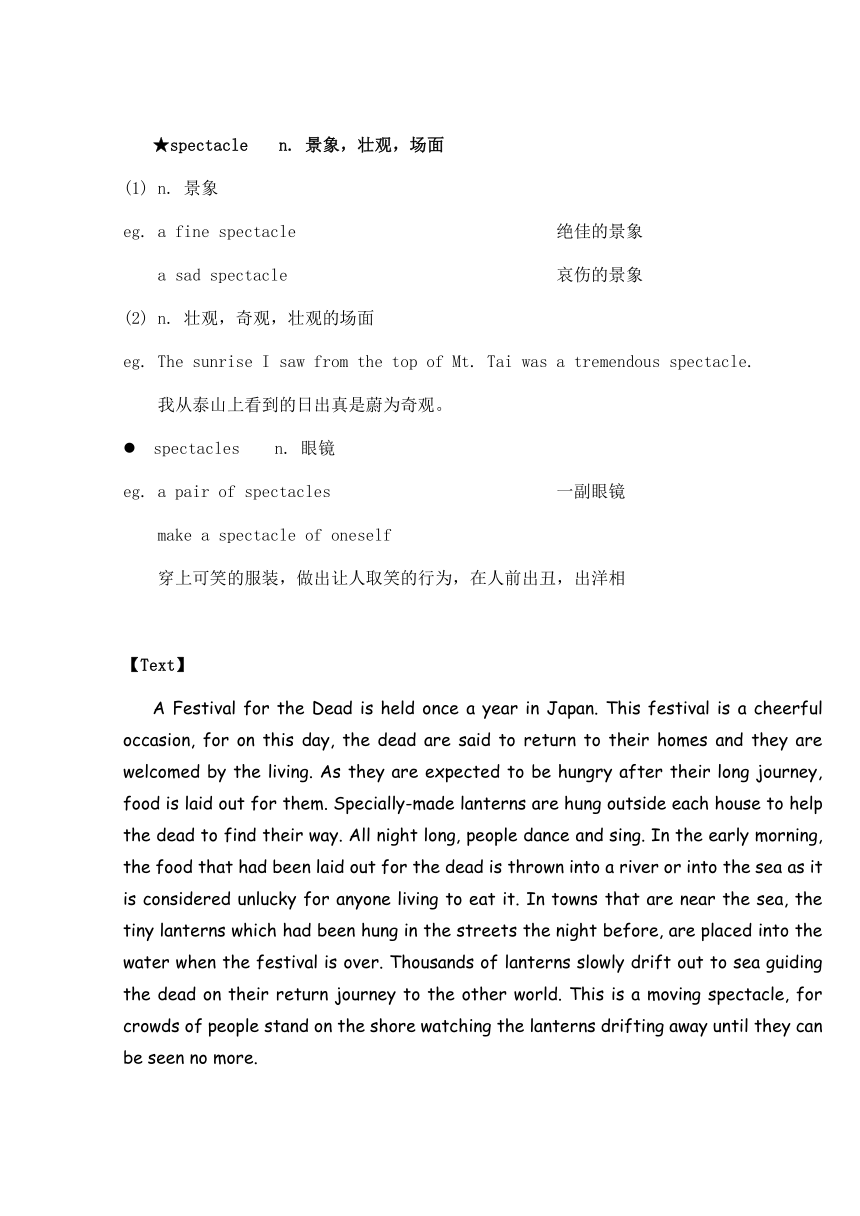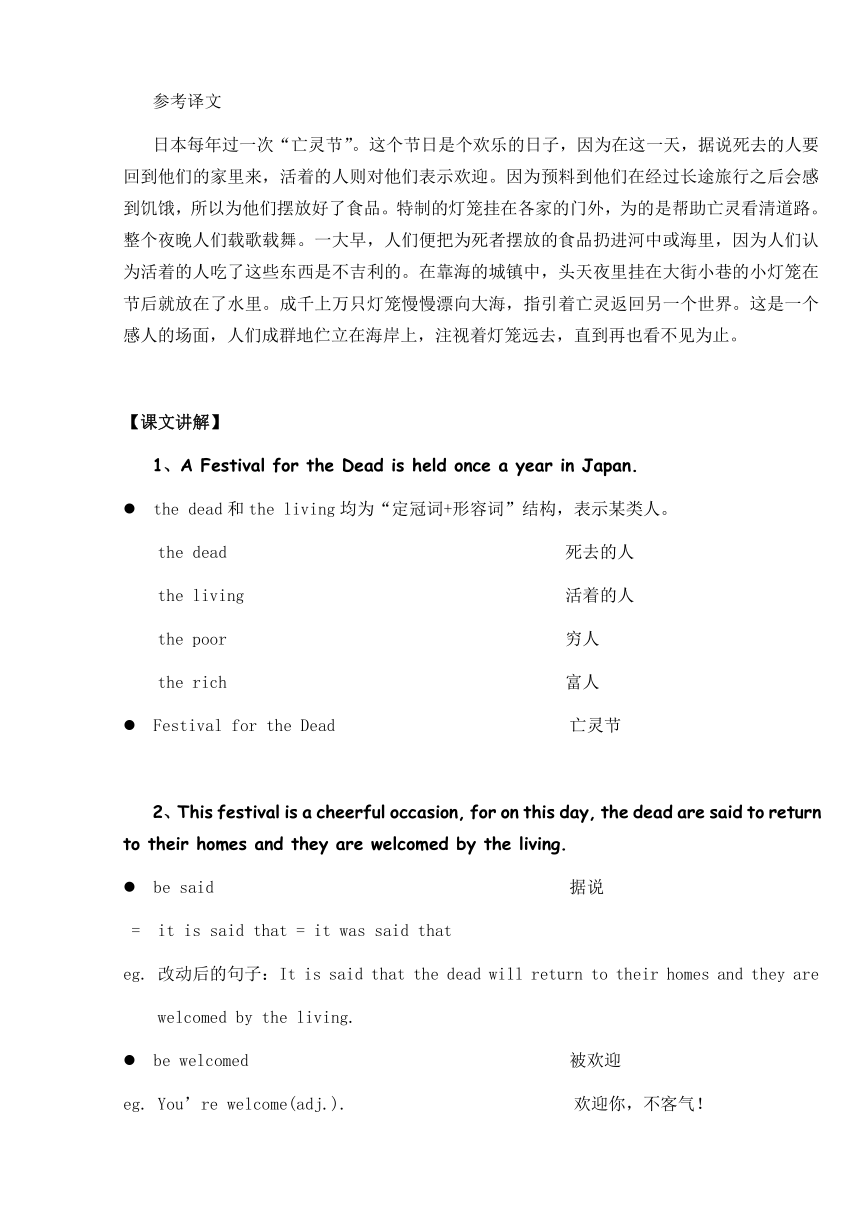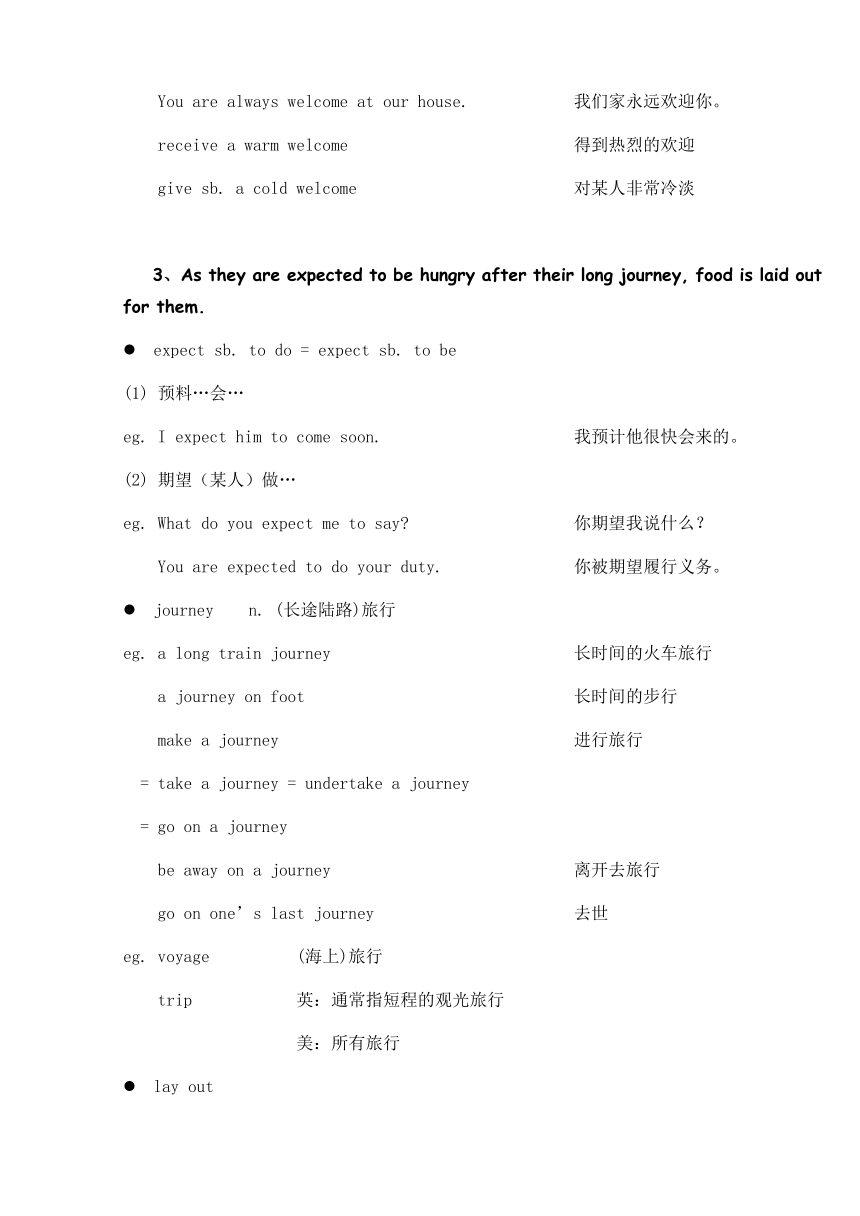新概念英语二册Lesson 96 The dead return 亡灵返乡超详教案讲义笔记
文档属性
| 名称 | 新概念英语二册Lesson 96 The dead return 亡灵返乡超详教案讲义笔记 |  | |
| 格式 | docx | ||
| 文件大小 | 24.3KB | ||
| 资源类型 | 教案 | ||
| 版本资源 | 新概念英语 | ||
| 科目 | 英语 | ||
| 更新时间 | 2023-09-26 06:42:51 | ||
图片预览




文档简介
Lesson 96 The dead return 亡灵返乡
【New words and expressions】(3)
festival n. 节日
lantern n. 灯笼
spectacle n. 景象,壮观,场面
★festival n. 节日
n. 喜庆,节日
eg. the Mid-Autumn Festival 中秋节
the Spring Festival 春节
They hold a festival on Independence Day. 他们在独立日举行庆典。
(中国的节日前加定冠词the,而西方的节日前通常不加定冠词。)
n. (定期举办的)文化性活动,…节
eg. Our school holds a musical festival every year.
我们学校每年举办音乐节。
★lantern n. 灯笼
n. 手提灯,提灯,灯笼
eg. light a lantern 点亮提灯
a Chinese lantern 中国灯笼
the Lantern Festival 元宵节
n. 天窗
★spectacle n. 景象,壮观,场面
n. 景象
eg. a fine spectacle 绝佳的景象
a sad spectacle 哀伤的景象
n. 壮观,奇观,壮观的场面
eg. The sunrise I saw from the top of Mt. Tai was a tremendous spectacle.
我从泰山上看到的日出真是蔚为奇观。
spectacles n. 眼镜
eg. a pair of spectacles 一副眼镜
make a spectacle of oneself
穿上可笑的服装,做出让人取笑的行为,在人前出丑,出洋相
【Text】
A Festival for the Dead is held once a year in Japan. This festival is a cheerful occasion, for on this day, the dead are said to return to their homes and they are welcomed by the living. As they are expected to be hungry after their long journey, food is laid out for them. Specially-made lanterns are hung outside each house to help the dead to find their way. All night long, people dance and sing. In the early morning, the food that had been laid out for the dead is thrown into a river or into the sea as it is considered unlucky for anyone living to eat it. In towns that are near the sea, the tiny lanterns which had been hung in the streets the night before, are placed into the water when the festival is over. Thousands of lanterns slowly drift out to sea guiding the dead on their return journey to the other world. This is a moving spectacle, for crowds of people stand on the shore watching the lanterns drifting away until they can be seen no more.
参考译文
日本每年过一次“亡灵节”。这个节日是个欢乐的日子,因为在这一天,据说死去的人要回到他们的家里来,活着的人则对他们表示欢迎。因为预料到他们在经过长途旅行之后会感到饥饿,所以为他们摆放好了食品。特制的灯笼挂在各家的门外,为的是帮助亡灵看清道路。整个夜晚人们载歌载舞。一大早,人们便把为死者摆放的食品扔进河中或海里,因为人们认为活着的人吃了这些东西是不吉利的。在靠海的城镇中,头天夜里挂在大街小巷的小灯笼在节后就放在了水里。成千上万只灯笼慢慢漂向大海,指引着亡灵返回另一个世界。这是一个感人的场面,人们成群地伫立在海岸上,注视着灯笼远去,直到再也看不见为止。
【课文讲解】
1、A Festival for the Dead is held once a year in Japan.
the dead和the living均为“定冠词+形容词”结构,表示某类人。
the dead 死去的人
the living 活着的人
the poor 穷人
the rich 富人
Festival for the Dead 亡灵节
2、This festival is a cheerful occasion, for on this day, the dead are said to return to their homes and they are welcomed by the living.
be said 据说
= it is said that = it was said that
eg. 改动后的句子:It is said that the dead will return to their homes and they are
welcomed by the living.
be welcomed 被欢迎
eg. You’re welcome(adj.). 欢迎你,不客气!
You are always welcome at our house. 我们家永远欢迎你。
receive a warm welcome 得到热烈的欢迎
give sb. a cold welcome 对某人非常冷淡
3、As they are expected to be hungry after their long journey, food is laid out for them.
expect sb. to do = expect sb. to be
预料…会…
eg. I expect him to come soon. 我预计他很快会来的。
期望(某人)做…
eg. What do you expect me to say 你期望我说什么?
You are expected to do your duty. 你被期望履行义务。
journey n. (长途陆路)旅行
eg. a long train journey 长时间的火车旅行
a journey on foot 长时间的步行
make a journey 进行旅行
= take a journey = undertake a journey
= go on a journey
be away on a journey 离开去旅行
go on one’s last journey 去世
eg. voyage (海上)旅行
trip 英:通常指短程的观光旅行
美:所有旅行
lay out
摆开,展示,摆设
eg. lay a map out on the table 在桌上展开一幅地图
lay out one’s clothes on the bed 把衣物铺在床上
设计(庭园,都市等),编排版面
eg. This house is laid out sensibly. 这间房子的设计颇具巧思。
4、Specially-made lanterns are hung outside each house to help the dead to find their way.
specially-made lanterns 特制的灯笼
(specially-made 复合形容词)
eg. man-made 人造的
home-made 家制的
hard-won 艰难赢来的
5、All night long, people dance and sing.
all night long 整夜
(long为副词,表示“整个,在整段期间中”,常与all连用)
all day long 一整天
= all the day
day and night 日日夜夜
day by day 逐日
In the early morning, the food that had been laid out for the dead is thrown into a river or into the sea as it is considered unlucky for anyone living to eat it.
in the early morning 一大早
(此处early作形容词修饰名词)
= early in the moring (early是个副词,修饰介词短语in the morning)
the food that had been laid out for the dead 那些为死者摆放的食物
(that引导定语从句修饰food)
as it is considered unlucky for anyone living to eat it
因为人们认为活着的人吃了这些东西是不吉利的。
(as引导原因状语从句,it是形式主语,真正的主语是for anyone living to eat it,不定式是真正的主语。)
anyone living 任何活着的人
(living是个形容词,作后置定语修饰anyone。)
7、In towns that are near the sea, the tiny lanterns which had been hung in the
streets the night before, are placed into the water when the festival is over.
In towns that are near the sea 在靠海的城镇
(that 引导定语从句修饰towns)
the tiny lanterns which had been hung in the streets the night before
头天夜里挂在大街小巷的小灯笼(which引导定语从句修饰lanterns)
8、Thousands of lanterns slowly drift out to sea guiding the dead on their return journey to the other world.
thousands of 成千上万
hundreds of 成百上千
millions of 成百万上千万
guide
v. 向导
eg. He guided the tourist party through the park. 他带着旅行团穿过了公园。
v. 指导某人,领导(国家,事业等),治理
eg. He guided his new business to success. 他管理他的新公司,走向成功。
v. (思想,感情等)支配(人) (常用被动结构)
eg. He is often guided by his sense of what is fun. 他常被他所认为的乐趣所支配。
n. 导游
eg. Can you hire a guide to show us around the city
你能不能雇个导游带我们在城里转一转?
a guide to the British Museum 大英博物馆简介
the other world 另一个世界,即阴间
the next world = the world to come 来世
make the best of both worlds 左右逢源,两面讨好
for all the world 无论怎样看都,完全绝对(强调否定)
eg. I won’t give up for all the world. 我绝对不会放弃的。
in the world
在世界上
究竟(强调疑问句)
eg. What in the world happened 究竟发生什么事了?
根本(强调否定句)
eg. She will never in the world say no. 她根本不会说不。
9、This is a moving spectacle, for crowds of people stand on the shore watching the lanterns drifting away until they can be seen no more.
moving adj. 动人的,感人的
a moving spectacle 一个感人的场面
【Summary Writing】
The Japanese annual Festival for the Dead is a cheerful occasion. As the dead are said to return home, food is laid out for them and lanterns are lit to guide them on their way. People dance and sing all night and the uneaten food is thrown into the sea or into a river the next morning. In some places, the lanterns are placed on the sea and people watch from the shore until the lanterns drift out of sight. (80 words)
The Japanese annual Festival for the Dead is a cheerful occasion, for the dead are said to return home. Not only is food laid out for them, but lanterns are lit to guide them as well while people dance and sing all night. The uneaten food is thrown into the sea or a river the next morning. In some places, the lanterns are placed on the sea. People watch from the shore as the lanterns drift out of sight.
(79 words)
【New words and expressions】(3)
festival n. 节日
lantern n. 灯笼
spectacle n. 景象,壮观,场面
★festival n. 节日
n. 喜庆,节日
eg. the Mid-Autumn Festival 中秋节
the Spring Festival 春节
They hold a festival on Independence Day. 他们在独立日举行庆典。
(中国的节日前加定冠词the,而西方的节日前通常不加定冠词。)
n. (定期举办的)文化性活动,…节
eg. Our school holds a musical festival every year.
我们学校每年举办音乐节。
★lantern n. 灯笼
n. 手提灯,提灯,灯笼
eg. light a lantern 点亮提灯
a Chinese lantern 中国灯笼
the Lantern Festival 元宵节
n. 天窗
★spectacle n. 景象,壮观,场面
n. 景象
eg. a fine spectacle 绝佳的景象
a sad spectacle 哀伤的景象
n. 壮观,奇观,壮观的场面
eg. The sunrise I saw from the top of Mt. Tai was a tremendous spectacle.
我从泰山上看到的日出真是蔚为奇观。
spectacles n. 眼镜
eg. a pair of spectacles 一副眼镜
make a spectacle of oneself
穿上可笑的服装,做出让人取笑的行为,在人前出丑,出洋相
【Text】
A Festival for the Dead is held once a year in Japan. This festival is a cheerful occasion, for on this day, the dead are said to return to their homes and they are welcomed by the living. As they are expected to be hungry after their long journey, food is laid out for them. Specially-made lanterns are hung outside each house to help the dead to find their way. All night long, people dance and sing. In the early morning, the food that had been laid out for the dead is thrown into a river or into the sea as it is considered unlucky for anyone living to eat it. In towns that are near the sea, the tiny lanterns which had been hung in the streets the night before, are placed into the water when the festival is over. Thousands of lanterns slowly drift out to sea guiding the dead on their return journey to the other world. This is a moving spectacle, for crowds of people stand on the shore watching the lanterns drifting away until they can be seen no more.
参考译文
日本每年过一次“亡灵节”。这个节日是个欢乐的日子,因为在这一天,据说死去的人要回到他们的家里来,活着的人则对他们表示欢迎。因为预料到他们在经过长途旅行之后会感到饥饿,所以为他们摆放好了食品。特制的灯笼挂在各家的门外,为的是帮助亡灵看清道路。整个夜晚人们载歌载舞。一大早,人们便把为死者摆放的食品扔进河中或海里,因为人们认为活着的人吃了这些东西是不吉利的。在靠海的城镇中,头天夜里挂在大街小巷的小灯笼在节后就放在了水里。成千上万只灯笼慢慢漂向大海,指引着亡灵返回另一个世界。这是一个感人的场面,人们成群地伫立在海岸上,注视着灯笼远去,直到再也看不见为止。
【课文讲解】
1、A Festival for the Dead is held once a year in Japan.
the dead和the living均为“定冠词+形容词”结构,表示某类人。
the dead 死去的人
the living 活着的人
the poor 穷人
the rich 富人
Festival for the Dead 亡灵节
2、This festival is a cheerful occasion, for on this day, the dead are said to return to their homes and they are welcomed by the living.
be said 据说
= it is said that = it was said that
eg. 改动后的句子:It is said that the dead will return to their homes and they are
welcomed by the living.
be welcomed 被欢迎
eg. You’re welcome(adj.). 欢迎你,不客气!
You are always welcome at our house. 我们家永远欢迎你。
receive a warm welcome 得到热烈的欢迎
give sb. a cold welcome 对某人非常冷淡
3、As they are expected to be hungry after their long journey, food is laid out for them.
expect sb. to do = expect sb. to be
预料…会…
eg. I expect him to come soon. 我预计他很快会来的。
期望(某人)做…
eg. What do you expect me to say 你期望我说什么?
You are expected to do your duty. 你被期望履行义务。
journey n. (长途陆路)旅行
eg. a long train journey 长时间的火车旅行
a journey on foot 长时间的步行
make a journey 进行旅行
= take a journey = undertake a journey
= go on a journey
be away on a journey 离开去旅行
go on one’s last journey 去世
eg. voyage (海上)旅行
trip 英:通常指短程的观光旅行
美:所有旅行
lay out
摆开,展示,摆设
eg. lay a map out on the table 在桌上展开一幅地图
lay out one’s clothes on the bed 把衣物铺在床上
设计(庭园,都市等),编排版面
eg. This house is laid out sensibly. 这间房子的设计颇具巧思。
4、Specially-made lanterns are hung outside each house to help the dead to find their way.
specially-made lanterns 特制的灯笼
(specially-made 复合形容词)
eg. man-made 人造的
home-made 家制的
hard-won 艰难赢来的
5、All night long, people dance and sing.
all night long 整夜
(long为副词,表示“整个,在整段期间中”,常与all连用)
all day long 一整天
= all the day
day and night 日日夜夜
day by day 逐日
In the early morning, the food that had been laid out for the dead is thrown into a river or into the sea as it is considered unlucky for anyone living to eat it.
in the early morning 一大早
(此处early作形容词修饰名词)
= early in the moring (early是个副词,修饰介词短语in the morning)
the food that had been laid out for the dead 那些为死者摆放的食物
(that引导定语从句修饰food)
as it is considered unlucky for anyone living to eat it
因为人们认为活着的人吃了这些东西是不吉利的。
(as引导原因状语从句,it是形式主语,真正的主语是for anyone living to eat it,不定式是真正的主语。)
anyone living 任何活着的人
(living是个形容词,作后置定语修饰anyone。)
7、In towns that are near the sea, the tiny lanterns which had been hung in the
streets the night before, are placed into the water when the festival is over.
In towns that are near the sea 在靠海的城镇
(that 引导定语从句修饰towns)
the tiny lanterns which had been hung in the streets the night before
头天夜里挂在大街小巷的小灯笼(which引导定语从句修饰lanterns)
8、Thousands of lanterns slowly drift out to sea guiding the dead on their return journey to the other world.
thousands of 成千上万
hundreds of 成百上千
millions of 成百万上千万
guide
v. 向导
eg. He guided the tourist party through the park. 他带着旅行团穿过了公园。
v. 指导某人,领导(国家,事业等),治理
eg. He guided his new business to success. 他管理他的新公司,走向成功。
v. (思想,感情等)支配(人) (常用被动结构)
eg. He is often guided by his sense of what is fun. 他常被他所认为的乐趣所支配。
n. 导游
eg. Can you hire a guide to show us around the city
你能不能雇个导游带我们在城里转一转?
a guide to the British Museum 大英博物馆简介
the other world 另一个世界,即阴间
the next world = the world to come 来世
make the best of both worlds 左右逢源,两面讨好
for all the world 无论怎样看都,完全绝对(强调否定)
eg. I won’t give up for all the world. 我绝对不会放弃的。
in the world
在世界上
究竟(强调疑问句)
eg. What in the world happened 究竟发生什么事了?
根本(强调否定句)
eg. She will never in the world say no. 她根本不会说不。
9、This is a moving spectacle, for crowds of people stand on the shore watching the lanterns drifting away until they can be seen no more.
moving adj. 动人的,感人的
a moving spectacle 一个感人的场面
【Summary Writing】
The Japanese annual Festival for the Dead is a cheerful occasion. As the dead are said to return home, food is laid out for them and lanterns are lit to guide them on their way. People dance and sing all night and the uneaten food is thrown into the sea or into a river the next morning. In some places, the lanterns are placed on the sea and people watch from the shore until the lanterns drift out of sight. (80 words)
The Japanese annual Festival for the Dead is a cheerful occasion, for the dead are said to return home. Not only is food laid out for them, but lanterns are lit to guide them as well while people dance and sing all night. The uneaten food is thrown into the sea or a river the next morning. In some places, the lanterns are placed on the sea. People watch from the shore as the lanterns drift out of sight.
(79 words)
同课章节目录
